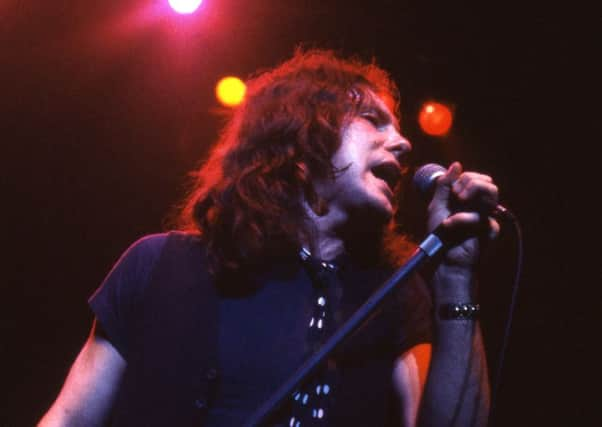Album reviews: Frankie Miller | C Duncan | Goat


Frankie Miller: Frankie Miller’s Double Take ****
UMC
C Duncan: The Midnight Sun ****
FatCat
Goat: Requiem ****
Rocket Recordings
It is a measure of the respect and influence Miller commands that Mackay assembled such a stellar cast list of collaborators – including Joe Walsh, Francis Rossi and Paul Carrack – most of whom Miller easily out-sings from down the years. Only Stewart and Willie Nelson can equal Miller for heart and pathos, while Bonnie Tyler matches him for gravel on the blues ballad True Love.
Miller inhabits a world of old-fashioned songs of love and heartbreak. A couple of blues boogie numbers could be the work of any competent bar band, but Miller can always be relied upon to provide the vocal class, excelling in his element as a naturally gritty rhythm’n’blues balladeer.
Advertisement
Hide AdAdvertisement
Hide AdDespite the overly slick production and mawkish sentiment of Sending Me Angels, Miller’s impassioned delivery shines through. Elton John overcooks his vocal contribution to rhythm’n’blues lament Where Do The Guilty Go but Miller’s emoting is wonderfully cathartic, and his duet with Sir Rod on Kiss Her For Me would bring a tear to a glass eye.
From a vintage talent to a seductive new musical voice… C Duncan made an instant splash last year with his distinctive home-recorded debut album, Architect, which cost him only £50 to produce yet ended up on the prestigious shortlists of the Mercury Music Prize and Scottish Album of the Year Award. On his equally budget-conscious follow-up, the Glasgow-based composer has moved from acoustic to electronic instrumentation, while retaining a similarly hymnal quality.
The Midnight Sun is about as far from the crass, blaring 21st century iteration of trance music as you can get, and much more sensual than most chillout soundtracks, built as it is around Duncan’s angelic voice, layered up to create heavenly, heady harmonies. You could lie back and bathe in opening track Nothing More; likewise, on the rippling synth pulse of Like You Do over which Duncan’s voice(s) soar. And on it floats, a sumptuous suite so soothing that it may possibly have healing powers and so exquisitely realised that Duncan could well be the adolescent offspring of The Blue Nile, capable of evoking rapturous romance without the weight of the world on his shoulders.
Continuing the run on idiosyncratic quality, Goat are a remarkable masked collective from Sweden who have spun a trippy tale about living in a commune on the edge of the Arctic Circle. Like C Duncan, they make devotional music, though their approach is rooted in acid psychedelia and infused with various shamanic flavours from around the world. Requiem, their third album, features less of the face-melting psych rock jams and places more emphasis on rhythmic, ruminative desert rock, with appealing flourishes such as fluttering recorder on the catchy Union of Sun and Moon and a handful of wonderful hippy dippy wigouts from the dawning of the Age of Aquarius.
CLASSICAL
Dragon Voices: The Giant Celtic Horns of Ancient Europe ****
Delphian
Around 25 years ago, musicologist, composer and Scottish music scholar John Purser initiated a plan to reconstruct an ancient Celtic instrument known as the carnyx. Based on fragments dug up in a Banffshire farm in the early 1800s, a team, including the trombonist John Kenny, set about making this happen, and within a couple of years a modern reconstruction of the lip reed instrument – a two-metre bronze trumpet with boar’s head, originally intended for the battlefield or accompanying rituals – was unveiled. Assuming the musical archaeologists got it right, this was an instrument of pungent sonority, mysterious tonal palette and startling versatility, and these specially created pieces – from the astounding virtuosity of The Hunt, to the ethereal strangeness of Ships in the Night – demonstrate. Kenny’s playing is mesmerising, his virtuosity capturing the primitive ecstasy of these obscure instruments.
Ken Walton
JAZZ
Dinosaur: Together, As One ****
Edition Records
Nothing in the least lumbering about this particular Dinosaur, a powerfully inventive young quartet led by trumpeter Laura Jurd, who also plays synths, Elliot Galvin on Fender Rhodes and Hammond organ, electric bassist Conor Chaplin and Scots drummer Corrie Dick.
Advertisement
Hide AdAdvertisement
Hide AdTonally vivid, the players dart deftly, jubilantly and occasionally bemusingly between tempi and idioms, trumpet bellings or Milesian rasps suddenly giving way to chiming, bubbling keyboards. The opening Awakening has Jurd’s bold, random soundings coalescing into melody over pizzicato keyboard effects and rattling percussion, electronic drones floating in the background, while pipe band-style snares introduce Robin, which swerves animatedly between folksiness and laid-back languor.
Extinct sees Jurd’s horn embark on a snorty safari over jungly rhythms while Interlude is a short, meditative showcase for Jurd’s playing.
Jim Gilchrist